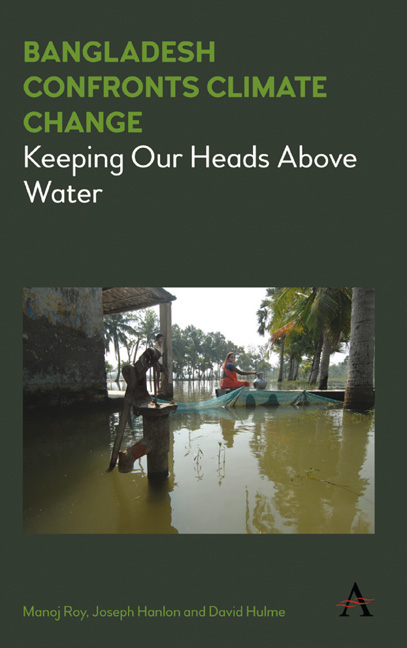Book contents
- Frontmatter
- Content
- List of Illustrations
- Abbreviations, Acronyms and Bangladeshi Terms
- Acknowledgements
- About the Authors
- Chapter One Actors, Not Victims
- Chapter Two How Will Climate Change Hit Bangladesh?
- Chapter Three Taking the Lead in Negotiations – and Moving Forward
- Chapter Four Sea Level Rise and the Vulnerable Coast – Where Farmers Know More than Engineers
- Chapter Five Saving Lives with Cyclone Shelters
- Chapter Six Living with Floods
- Chapter Seven Agronomists Keeping Ahead of Climate Change
- Chapter Eight No Climate Change Migrants – Yet
- Chapter Nine How Can the Privatized Megacity Cope with Climate Change?
- Chapter Ten Is Climate Change Only a Problem for the Urban Poor?
- Chapter Eleven Power – Political, Financial and Electrical
- Chapter Twelve Bangladesh on the Front Line of Climate Change
- Index
Chapter Four - Sea Level Rise and the Vulnerable Coast – Where Farmers Know More than Engineers
Published online by Cambridge University Press: 22 July 2017
- Frontmatter
- Content
- List of Illustrations
- Abbreviations, Acronyms and Bangladeshi Terms
- Acknowledgements
- About the Authors
- Chapter One Actors, Not Victims
- Chapter Two How Will Climate Change Hit Bangladesh?
- Chapter Three Taking the Lead in Negotiations – and Moving Forward
- Chapter Four Sea Level Rise and the Vulnerable Coast – Where Farmers Know More than Engineers
- Chapter Five Saving Lives with Cyclone Shelters
- Chapter Six Living with Floods
- Chapter Seven Agronomists Keeping Ahead of Climate Change
- Chapter Eight No Climate Change Migrants – Yet
- Chapter Nine How Can the Privatized Megacity Cope with Climate Change?
- Chapter Ten Is Climate Change Only a Problem for the Urban Poor?
- Chapter Eleven Power – Political, Financial and Electrical
- Chapter Twelve Bangladesh on the Front Line of Climate Change
- Index
Summary
As the motorcade of the local member of parliament, Abdul Wahab, passed through Kalishakul village, it was attacked by several thousand angry villagers. Twelve vehicles were burned. Wahab escaped, but a water board engineer, the sub-district chairman and a police superintendent were injured in the 2 June 2012 incident. The motorcade was on its way to launch construction of a dam in Kapila Beel, which many local people opposed. It was one of the most violent incidents in a 50-year struggle of local people to reverse a system of dykes and polders built in the 1960s and 1970s, which caused thousands of hectares to become permanently flooded and waterlogged, with hugely detrimental effects on local agriculture and livelihoods. Local people want an updated version of a system that dates back at least to the seventeenth century and involves using the silt deposited by annual flooding to raise the level of the land. When people launched their campaign, they had never heard of climate change, but they have won broad support from leading political and technical figures who realize it is an important response to rising sea levels.
Less than a year later, on 14 March 2013, the people of Chalan Beel formed a 220 km human chain along the banks of the dying Boral River. ‘We demand removal of all sluice gates and cross dams on the river,’ said Dr Matin, the spokesperson for the four groups that organized the demonstration. In both cases the demand was for changes to structures – dams and embankments – and to combine ancient knowledge with modern technology to work with nature and not against it. In both cases the problem is large earthworks imposed by engineers and international agencies, without taking into account the very complex structure of the Bengal delta and without paying attention to local knowledge.
For centuries Bengalis have been building embankments and canals to try to manage this ever-changing delta, to try to increase agricultural production while controlling floods and defending against cyclones. But not all of these interventions have been successful. In particular, some embankments and dams built in the colonial era and after independence disrupted water flows in ways that did considerable harm.
- Type
- Chapter
- Information
- Bangladesh Confronts Climate ChangeKeeping Our Heads above Water, pp. 41 - 62Publisher: Anthem PressPrint publication year: 2016

